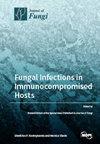Five New Species of Wood-Decaying Brown-Rot Fungi within Postiaceae (Polyporales, Basidiomycota) from Xinjiang, Northwest China
IF 4.2
2区 生物学
Q2 MICROBIOLOGY
引用次数: 0
Abstract
Brown-rot fungi are an important group of wood-decaying fungi, but there has been limited research on the species diversity of brown-rot fungi in Xinjiang, China. During an investigation of brown-rot fungi in Xinjiang, from July 2018 to July 2023, five new species belonging to the family Postiaceae were discovered based on morphological and molecular evidence. Amaropostia altaiensis is characterized by a conchate pileus, circular pores (5–8 per mm), and growing on Populus. Amaropostia tianshanensis is characterized by a flabelliform-to-conchate pileus, angular pores (5–6 per mm), and growing on Picfea. Cyanosporus latisporus is characterized by a hirsute and dark greyish blue pileal surface with fresh, larger pores (3–6 per mm) and broad basidiospores (4.3–5.9 × 1.4–2 µm). Cyanosporus tianshanensis is characterized by a smooth and white-to-cream pileal surface with fresh, smaller pores (6–9 per mm). Osteina altaiensis is characterized by a light mouse-grey-to-honey-yellow pileal surface, smaller pores (4–6 per mm), and slightly wide basidiospores (5–6 × 1.7–2.2 µm). Each of these five new species form independent lineages in phylogenetic analyses based on the seven gene loci (ITS + nLSU + nSSU + mtSSU + TEF1 + RPB1 + RPB2). This research enriches the diversity of brown-rot fungi species, while also demonstrating the substantial discovery potential and research value of brown-rot fungi in Xinjiang.中国西北新疆后生菌科(多孔菌目,担子菌纲)木材腐朽褐根真菌的五个新种
褐腐真菌是一类重要的木材腐朽真菌,但目前对中国新疆褐腐真菌物种多样性的研究十分有限。在2018年7月至2023年7月对新疆褐腐真菌的调查中,根据形态学和分子证据发现了属于后生菌科的5个新种。阿尔泰褐腐菌(Amaropostia altaiensis)的特征是绒毛呈海螺状,圆孔(每毫米5-8个),生长在杨树上。Amaropostia tianshanensis 的特征为扇形到壳状的绒毛、角状气孔(每毫米 5-6 个),生长在白杨树上。latisporus 青孢子菌的特征是绒毛表面多毛,呈深灰蓝色,有新鲜、较大的气孔(每毫米 3-6 个)和宽大的基生孢子(4.3-5.9 × 1.4-2 微米)。天山蓝孢子菌的特点是绒毛表面光滑,呈白色至乳白色,有新鲜的较小气孔(每毫米 6-9 个)。阿尔泰蓝孢子菌(Osteina altaiensis)的特点是绒毛表面呈浅鼠灰色至蜂蜜黄色,气孔较小(每毫米 4-6 个),基部孢子稍宽(5-6 × 1.7-2.2 µm)。在基于七个基因位点(ITS + nLSU + nSSU + mtSSU + TEF1 + RPB1 + RPB2)的系统发育分析中,这五个新物种各自形成独立的系。这项研究丰富了褐腐真菌物种的多样性,同时也表明新疆褐腐真菌具有巨大的发现潜力和研究价值。
本文章由计算机程序翻译,如有差异,请以英文原文为准。
求助全文
约1分钟内获得全文
求助全文
来源期刊

Journal of Fungi
Medicine-Microbiology (medical)
CiteScore
6.70
自引率
14.90%
发文量
1151
审稿时长
11 weeks
期刊介绍:
Journal of Fungi (ISSN 2309-608X) is an international, peer-reviewed scientific open access journal that provides an advanced forum for studies related to pathogenic fungi, fungal biology, and all other aspects of fungal research. The journal publishes reviews, regular research papers, and communications in quarterly issues. Our aim is to encourage scientists to publish their experimental and theoretical results in as much detail as possible. Therefore, there is no restriction on paper length. Full experimental details must be provided so that the results can be reproduced.
 求助内容:
求助内容: 应助结果提醒方式:
应助结果提醒方式:


